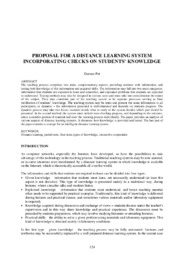Proposal for a Distance Learning System Incorporating Checks on Students’ Knowledge
Abstract
The teaching process comprises two main, complementary aspects: providing students with information, and testing both knowledge of this information and acquired skills. The information may fall into two main categories: information that students are expected to learn and remember, and explained problems that students are expected to understand. Testing methods may also be designed in various ways and must take into consideration the nature of the subject. They may constitute part of the teaching system or be separate processes serving as final verification of students’ knowledge. The teaching system may be static and present the same information to all participants, or dynamic – the information presented is individualised and depends on students progress. The dynamic process may take two forms: students decide what to study or the system decides which part should be presented. In the second method, the system must include tests checking progress, and depending on the outcome, select a suitable portion of material and steer the learning process individually. The paper provides an analysis of various aspects of distance learning systems. It discusses how knowledge is provided and tested. The last part of the paper contains a concept for an intelligent distance learning system.
